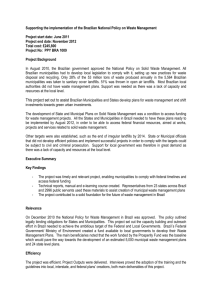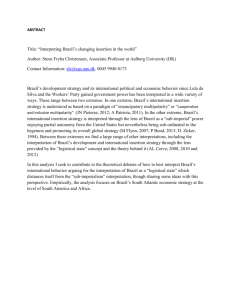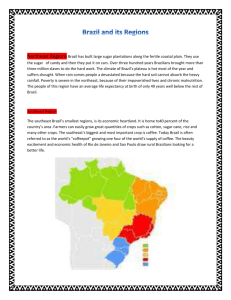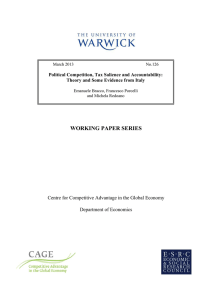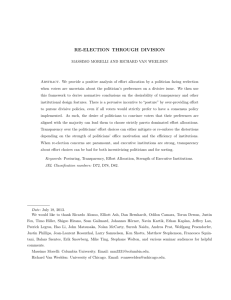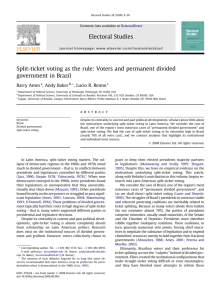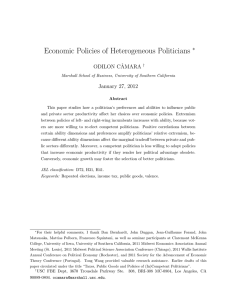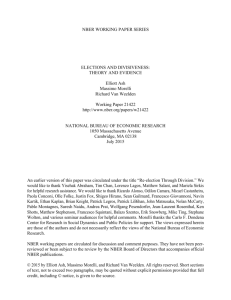evidence
advertisement
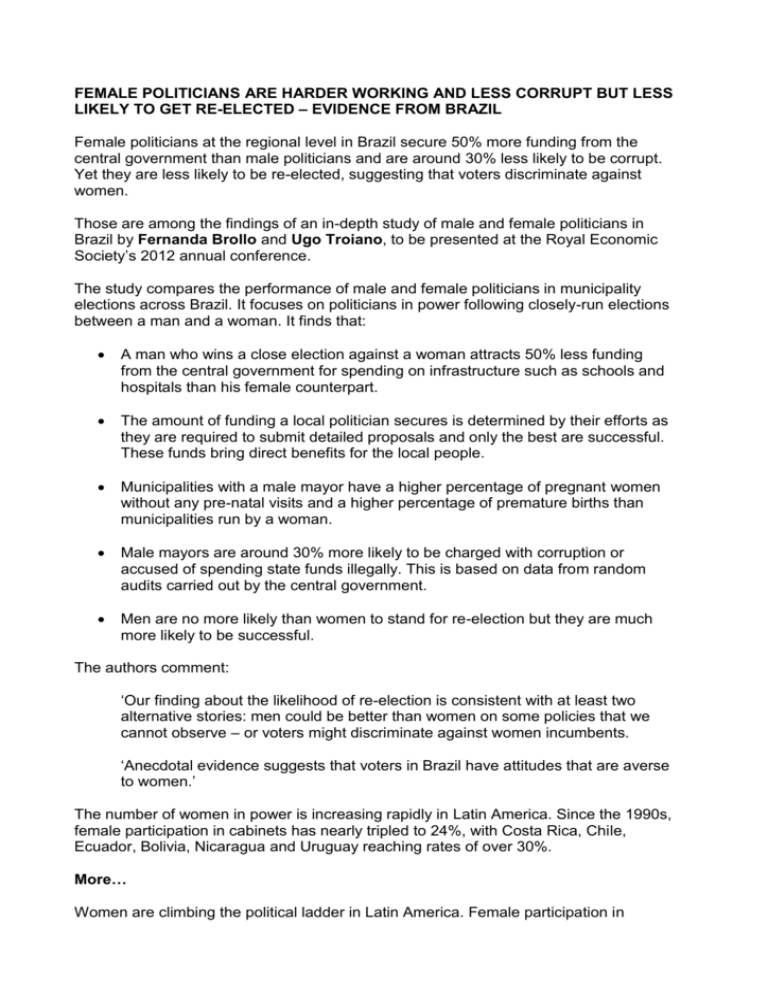
FEMALE POLITICIANS ARE HARDER WORKING AND LESS CORRUPT BUT LESS LIKELY TO GET RE-ELECTED – EVIDENCE FROM BRAZIL Female politicians at the regional level in Brazil secure 50% more funding from the central government than male politicians and are around 30% less likely to be corrupt. Yet they are less likely to be re-elected, suggesting that voters discriminate against women. Those are among the findings of an in-depth study of male and female politicians in Brazil by Fernanda Brollo and Ugo Troiano, to be presented at the Royal Economic Society’s 2012 annual conference. The study compares the performance of male and female politicians in municipality elections across Brazil. It focuses on politicians in power following closely-run elections between a man and a woman. It finds that: A man who wins a close election against a woman attracts 50% less funding from the central government for spending on infrastructure such as schools and hospitals than his female counterpart. The amount of funding a local politician secures is determined by their efforts as they are required to submit detailed proposals and only the best are successful. These funds bring direct benefits for the local people. Municipalities with a male mayor have a higher percentage of pregnant women without any pre-natal visits and a higher percentage of premature births than municipalities run by a woman. Male mayors are around 30% more likely to be charged with corruption or accused of spending state funds illegally. This is based on data from random audits carried out by the central government. Men are no more likely than women to stand for re-election but they are much more likely to be successful. The authors comment: ‘Our finding about the likelihood of re-election is consistent with at least two alternative stories: men could be better than women on some policies that we cannot observe – or voters might discriminate against women incumbents. ‘Anecdotal evidence suggests that voters in Brazil have attitudes that are averse to women.’ The number of women in power is increasing rapidly in Latin America. Since the 1990s, female participation in cabinets has nearly tripled to 24%, with Costa Rica, Chile, Ecuador, Bolivia, Nicaragua and Uruguay reaching rates of over 30%. More… Women are climbing the political ladder in Latin America. Female participation in cabinets nearly tripled to 24% between the 1990s and 2007, with Costa Rica, Chile, Ecuador, Bolivia, Nicaragua and Uruguay reaching rates of over 30%. Furthermore, women's representation in the lower houses of Latin American congresses doubled from an average of 11% in 1997 to 22% in 2009. In addition to increases in women’s legislative participation, six women have governed as presidents of Latin American countries. In recent years the idea that women are a positive force in political systems has spread. During the first three months of President Dilma Rousseff's mandate in Brazil, four ministers were forced to resign because of corruption scandals. Dilma's government has became famous for the ‘faxina’ (cleaning) of corruption she has promoted, which has jeopardised congressional support, particularly because most revelations fell on the heads of parties within the PT's coalition. This study uses a rich dataset on Brazilian municipalities to study the effect of women's leadership on policy outcomes in close races. It finds that women perform better than men in several dimensions. The research questions and findings can be summarised as follows. First, the researchers study whether the allocation of infrastructure transfers in Brazil is influenced by the gender of the politician after a contested election between two candidates of different sex. There are two main reasons why attracting discretionary infrastructure transfers is an important performance measure of the effort of the politician while in office. First of all, the effort of the mayor is a crucial determinant for attracting those transfers. The municipal administration presents a detailed project proposal, including its expected timeline, and the quality of this proposal determines the allocation of those transfers. Second, infrastructure projects are salient for voters and can potentially affect the electoral outcomes. The study finds that a man winning a close election against a woman attracts 50% less infrastructure transfers than their female counterpart. Second, the researchers study whether female mayors deliver more female oriented public goods. In close races, municipalities with a male mayor present a higher percentage of women without any pre-natal visits (60% of the sample mean) and a lower percentage of non-premature births (1.3% of the sample mean). Moreover, the effects of policies on health outcomes are concentrated for babies delivered by less educated mothers. Additionally, the study investigates whether the gender of a politician has any effect in different types of administrative irregularities pointed out in the audit reposts for municipal administrations in randomly selected municipalities. The researchers collect data for all municipalities with a mixed gender elections where randomly allocated audit reports were available. By using this subset of municipalities, they provide evidence that male mayors have a higher probability overall of engaging in corruption episodes and in illegal procurement practices. The size of the effect is big, ranging from 33% to 38% and from 18% to 33%, respectively. Finally, they ask whether the probability of re-election or the decision to rerun after a close mixed gender election is affected by the gender of the incumbent. They find that female candidates elected after a contested mixed election have a lower probability of being re-elected compared with their male counterparts, but they have the same probability of deciding to run for re-election after the first term. This finding is consistent with at least two alternative stories: men could be better than women on some policies that the econometrician cannot observe; or voters might discriminate against women incumbents. Anecdotal evidence suggests that voters in Brazil have attitudes that are averse to women. ENDS Contact: Fernanda Brollo University of Alicante Email: fernanda.brollo@gmail.com +34 674081972 Ugo Troiano Harvard University
